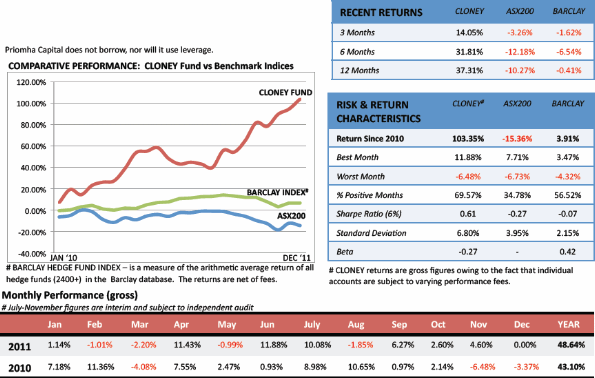Previously we reported on the Galileo Managed Sports Fund, which claims to be the world’s first sports betting hedge fund. In 2009 Priomha Capital entered this space in Australia. It currently offers a multi-sport and event fund, called the Priomha CLONEY Fund. Since January 2010 the fund has returned 81.6% compared to the ASX200 return of -9.6% over the same period. Priomha Capital plans to offer two additional funds in 2012. The first will be an Australian horse racing fund and the second will be a football codes fund that focuses on AFL, NFL, rugby union and football (soccer).
Priomha Capital was founded in 2009 by a group of senior finance and gaming executives who saw the opportunity to achieve superior returns through the application of portfolio and investment theory to sports betting. Investment decisions are made “through undertaking extensive statistical and trending analysis coupled with rigorous background research and market intelligence. Additionally, through the use of computer programmers, software developers and IT specialists Priomha have developed sport-specific algorithms that are used to identify value in all markets.”
The concept of a sports betting fund is appealing because it provides investors with an alternative to traditional investments such as bonds, property and shares. A sports fund enables investors to further diversify into an area that is independent of global market events.
Due to bookmaker margins, operating a sports betting fund is incredibly challenging. If you think of bookmaker margins as a transaction cost, the transaction costs involved with sports betting are fairly significant. Also, because most bookmakers accept ‘recreational gamblers’ only, a fund must make heavy or even exclusive use of betting exchanges such as Betfair. One challenge with an exchange is liquidity. A multi-million dollar fund may be limited to the more popular sporting events due to a lack of market depth in less popular sports. Typically however, the popular events are the most scrutinised ones, which could make finding value bets difficult.
There are punters who have made millions using Betfair, so the concept of a sports betting fund is certainly plausible. Due to the lure of an investment that is immune to global market events, it seems reasonable to expect this investment area to grow. According to a Priomha Capital investor report, “PricewaterhouseCoopers have estimated that on-line sports investing revenue will reach upward of US$144 billion this year while according to Merrill Lynch by 2015 this figure will be greater than US$500 billion.”
Time will tell how well these funds perform in the long term. If a fund can make a killing on a betting exchange perhaps this will lure additional participants whose presence will lead to more efficient odds markets and therefore less value betting opportunities. This could bringing returns back down to a level that is in line with the portfolio’s risk.
The Priomha CLONEY Fund’s return of 81.6% since January 2010 is impressive, but it would be interesting to know the amount of risk being taken. Typically with investing, the higher the expected return, the higher the risk. One risk measure is the standard deviation of returns. To get a better picture of a portfolio’s performance, you need to know both the expected return and standard deviation of the fund. If you’re getting double the returns of the stock market, are you taking on less than or more than twice the amount of risk to do so?
Until more data and funds history become available, it is hard to judge how well the sports betting hedge fund industry will do. Until then, watch this space!
Update:
Priomha Capital sent us the following fact sheet (PDF file), which provides both risk and return statistics. Using data from 2010 to December 2011, the fund’s Sharpe ratio, standard deviation and beta are provided and comapred to the ASX200. Below is a summary image from the fact sheet.



just come across this article.is fund still current?
As far as I’m aware, yes. As of 2014 it is using Deloitte Australia as its independent auditor of results.